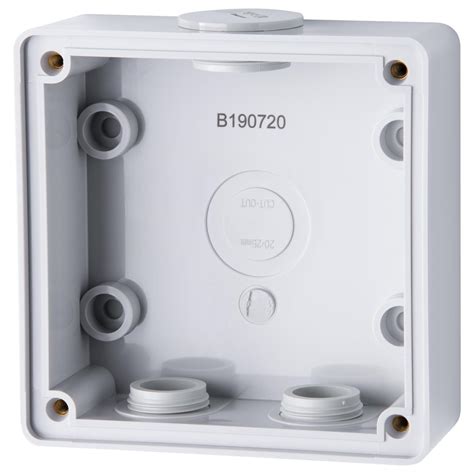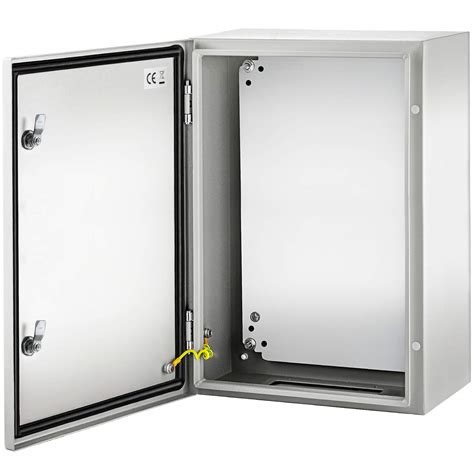do junction boxes have to be metal Known as a junction box, this metal or plastic enclosure protects the wiring. But .
Offering you a complete choice of products which include obo bettermann jbm 20038 20 underfloor connection socket junction box for metal duct and obo bettermann jbt 19035 10 underfloor outlet junction box for pvc duct. 449.832 kg/100 pcs.
0 · shallow metal electrical boxes
1 · outdoor metal junction box
2 · metal electrical junction boxes
3 · large metal electrical junction box
4 · galvanized steel junction box
5 · electrical metal boxes wall mounted
6 · 4 metal electrical outlet box
7 · 24x24 pvc junction box
$11.99
Do metal junction boxes always have to be grounded? Metal junction boxes always need to be grounded, whether you're using NM (non-metallic) plastic-sheathed cable or metallic cable. Metallic cable is self-grounding, as long as the cable is properly secured to the box.15 amps: A cable labeled "14-2 with ground" will have two insulated conductors with .BX cable is a type of metal-clad, armored cable. Learn the basics of armored BX .It also prevents the cable from rubbing against the edge of the box and .
A junction box is not a special type of box but any standard electrical box used to .Known as a junction box, this metal or plastic enclosure protects the wiring. But .
They are typically made of metal or plastic and are attached to a beam or possibly the drywall. The front of the box is closed with a plate, and inside are wires spliced together. The protective little junction box promotes .
Junction boxes must be made of non-combustible material, such as metal or plastic. They must be suitable for the specific environment in which they are installed. For example, if . Metal junction boxes can withstand a huge variety of adverse environmental conditions, including crushing impacts, open flames and extremely hot or cold temperatures. They also serve as natural grounding points for . Known as a junction box, this metal or plastic enclosure protects the wiring. But some devices do not require a separate junction box. Usually, they have their own integrated boxes or enclosures for making the wire . Metal boxes must be used with metallic cables or conduit. Answers based on the National Electrical Code. Local amendments may apply. Check with your local building officials. Remember Junction boxes have to be accessible. .
Junction boxes are available in metal and plastic. Metal boxes are used for metal conduit or armored (BX) cable installations. They provide excellent durability and grounding capabilities. You can wire a whole home using only non- metallic boxes, but metal boxes still come in handy for certain situations. They’re extremely sturdy and work well where you need lots of volume in the box—for example, for a . Do metal junction boxes always have to be grounded? Metal junction boxes always need to be grounded, whether you're using NM (non-metallic) plastic-sheathed cable or metallic cable. Metallic cable is self-grounding, as long as the cable is properly secured to the box.The short answer is ‘no’, a junction box does not necessarily have to be metal. While metal junction boxes are the most common type, they are not the only option available. The main purpose of a junction box is to protect electrical wiring and connections from moisture, dust and other contaminants.
They are typically made of metal or plastic and are attached to a beam or possibly the drywall. The front of the box is closed with a plate, and inside are wires spliced together. The protective little junction box promotes electrical safety as it prevents those wires from touching each other, or from anyone who comes in contact with the box.
A junction box is not a special type of box but any standard electrical box used to enclose wire splices. The most commonly used box for junctions is a 4-inch square box (either metal or strong plastic), which offers ample space for making wire connections with multiple wires or . Junction boxes must be made of non-combustible material, such as metal or plastic. They must be suitable for the specific environment in which they are installed. For example, if you need to install your junction box in a damp or wet location, it must . Metal junction boxes can withstand a huge variety of adverse environmental conditions, including crushing impacts, open flames and extremely hot or cold temperatures. They also serve as natural grounding points for metal-sheathed wires and other components that require electrical grounding. Known as a junction box, this metal or plastic enclosure protects the wiring. But some devices do not require a separate junction box. Usually, they have their own integrated boxes or enclosures for making the wire connections. Learn which devices don't need junction boxes, and when to install junction boxes. What Is a Junction Box?
Metal boxes must be used with metallic cables or conduit. Answers based on the National Electrical Code. Local amendments may apply. Check with your local building officials. Remember Junction boxes have to be accessible. Under the insulation is not acceptable. Metal boxes are better when you need the strength and volume to make up a ton of wires. Junction boxes are available in metal and plastic. Metal boxes are used for metal conduit or armored (BX) cable installations. They provide excellent durability and grounding capabilities. You can wire a whole home using only non- metallic boxes, but metal boxes still come in handy for certain situations. They’re extremely sturdy and work well where you need lots of volume in the box—for example, for a welder receptacle in your workshop or for a hub where multiple cables meet. Do metal junction boxes always have to be grounded? Metal junction boxes always need to be grounded, whether you're using NM (non-metallic) plastic-sheathed cable or metallic cable. Metallic cable is self-grounding, as long as the cable is properly secured to the box.
The short answer is ‘no’, a junction box does not necessarily have to be metal. While metal junction boxes are the most common type, they are not the only option available. The main purpose of a junction box is to protect electrical wiring and connections from moisture, dust and other contaminants. They are typically made of metal or plastic and are attached to a beam or possibly the drywall. The front of the box is closed with a plate, and inside are wires spliced together. The protective little junction box promotes electrical safety as it prevents those wires from touching each other, or from anyone who comes in contact with the box.
A junction box is not a special type of box but any standard electrical box used to enclose wire splices. The most commonly used box for junctions is a 4-inch square box (either metal or strong plastic), which offers ample space for making wire connections with multiple wires or .
Junction boxes must be made of non-combustible material, such as metal or plastic. They must be suitable for the specific environment in which they are installed. For example, if you need to install your junction box in a damp or wet location, it must .
Metal junction boxes can withstand a huge variety of adverse environmental conditions, including crushing impacts, open flames and extremely hot or cold temperatures. They also serve as natural grounding points for metal-sheathed wires and other components that require electrical grounding.
Known as a junction box, this metal or plastic enclosure protects the wiring. But some devices do not require a separate junction box. Usually, they have their own integrated boxes or enclosures for making the wire connections. Learn which devices don't need junction boxes, and when to install junction boxes. What Is a Junction Box? Metal boxes must be used with metallic cables or conduit. Answers based on the National Electrical Code. Local amendments may apply. Check with your local building officials. Remember Junction boxes have to be accessible. Under the insulation is not acceptable. Metal boxes are better when you need the strength and volume to make up a ton of wires.
Junction boxes are available in metal and plastic. Metal boxes are used for metal conduit or armored (BX) cable installations. They provide excellent durability and grounding capabilities.
german ww2 metal pistol transit box

shallow metal electrical boxes
outdoor metal junction box

With this BK planner, you will have the chance to do it yourself, and increase your productivity right away! The Perfect Planner by BK comes with monthly, weekly, and daily planning options, and is undated, giving you more control compared to an average planner, and reducing waste.
do junction boxes have to be metal|outdoor metal junction box